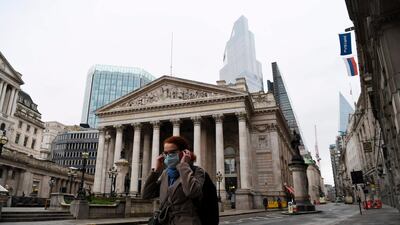Britain’s biggest banks are strong enough to cope with the Covid-19 pandemic and a no-deal Brexit, the Bank of England concluded in its latest financial health check.
The regulator has ensured that the UK banking system “remains resilient” against any serious financial shocks and can continue to lend to businesses and households during the crisis and absorb any fallout from the risks of a bad exit from the EU.
“This reflects the build-up of substantial buffers of capital since the global financial crisis,” the bank’s Financial Policy Committee, which is tasked with protecting the financial system, said in a report on Friday.
The central bank said the countercyclical capital buffer – extra money banks set aside during good economic times – would be held at zero until at least the last quarter of 2021.
Banks would not need to act on any future changes until the end of 2022 and should use this flexibility to underpin lending to the rest of the economy.
“Cutting support to the economy to avoid the use of capital buffers would be costly for the wider economy and consequently for banks themselves,” the BoE said.
The UK’s economy has been hammered by the pandemic, with output contracting by 19.8 per cent in the second quarter of this year when the country went into lockdown.
Britain’s economy is expected to shrink by 11 per cent this year as a result of Covid-19, according to the BoE’s November forecast, and grow by 7.25 per cent next year, taking until the first three months of 2022 to return to its size before the pandemic.
UK finance minister Rishi Sunak said last month that unemployment is expected to peak at 7.5 per cent in the second quarter of next year.
While the BoE expects more “headwinds” in the coming quarters as unemployment, business insolvencies and risk weights on banks’ exposure increase, it said the country’s major banks were capable of absorbing £200 billion ($265bn) in credit losses.
However, those types of losses would involve “incredibly severe” shocks that are unlikely to occur, such as unemployment rising to 15 per cent or house prices falling by 30 per cent.
The unemployment rate hit 4.8 per cent in the three months through to September, while Britain's house prices are on their strongest run since 2004, increasing by 7.6 per cent in November compared with a month earlier.. The average home now sells for £253,000, according to Halifax's House Price Index.
While the regulator said financial services faced “some disruption” when the Brexit transition ends, the Financial Policy Committee said most risks to the country’s financial stability had already been “mitigated” due to extensive preparations made by authorities and the private sector over the years.
It also said that major banks such as HSBC and Barclays could cope with the fallout from Brexit even if there is no trade agreement in place.
“However, financial stability is not the same as market stability or the avoidance of any disruption to users of financial services," the BoE said.
"Some market volatility and disruption to financial services, particularly to EU-based clients, could arise.
"Market volatility could be reinforced in the event that some derivative users are not fully ready to trade with EU counterparties or on EU or EU-recognised trading venues. Financial institutions should continue taking measures to minimise disruption.”
Former BoE Monetary Policy Committee member Andrew Sentence told the BBC that the bank’s assessment of the economic outlook “makes sense”. However, he said that outside the financial system, a no-deal Brexit would pose big challenges.
“The real economy is going to struggle if we go into a Brexit no-deal,” he said.
The BoE's latest stamp of approval on the industry's financial health comes a day after it said lenders could resume dividends, ending a ban imposed in March to conserve capital during the first wave of the Covid-19 outbreak.
In August, the lender pared back its predictions for loan losses stemming from the pandemic.
The latest analysis comes before today's deadline set by Brexit negotiators to strike a deal amid worries that the talks will end in collapse.
The European Union is strengthening its no-deal contingency plans, while big banks in the City of London are moving hundreds of billions of dollars in assets to the bloc.
The BoE said it did not plan a post-Brexit relaxation of financial standards.
"Irrespective of the particular form of the UK's future relationship with the EU ... the Financial Policy Committee remains committed to the implementation of robust prudential standards in the UK," it said.
The BoE also said it would review the test that borrowers must pass if they want a mortgage, with the FPC recommending limits to the proportion of new mortgages with high loan-to-income ratios.
The lender first unveiled a tougher "affordability" test in 2014 to ensure borrowers do not become overly indebted.
With interest rates currently at record lows, banks have already been reining in high-loan-to-income mortgages since pandemic started, with the number of advertised mortgage products "materially lower" than the start of the year.


